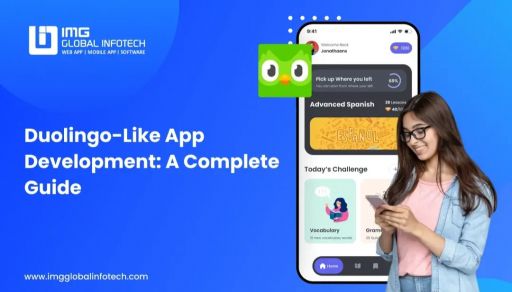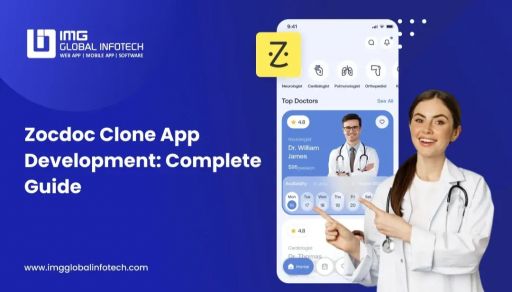Java Vs Kotlin Which Is Better For Android App Development?
Mohit Mittal
Jul 16, 2025
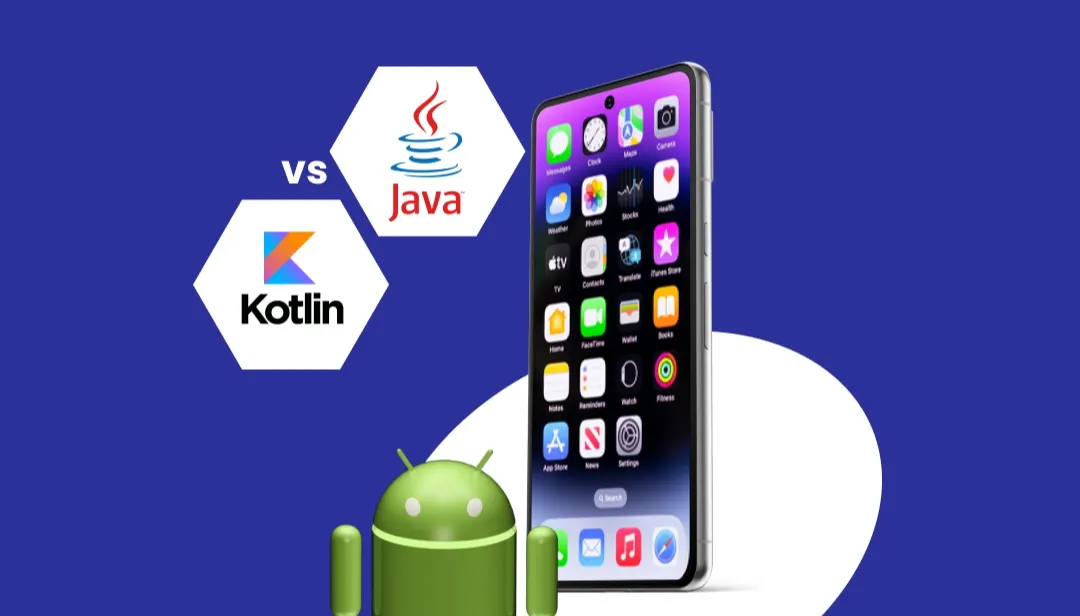
In the fast-evolving world of mobile technology, Android continues to dominate as the most widely used mobile operating system across the globe. Whether you’re a startup building your first android app or an enterprise enhancing your mobile app presence, one important decision every Android app development project has to make is the choice of programming language. And when it comes to Android, two names come at the top of the list: Java and Kotlin.
Java has been the backbone of Android app development since the platform’s inception. Known for its stability, large android app developer community, and time-tested performance, Java remains a reliable choice for many. However, the landscape began to shift when Google announced official support for Kotlin in 2017. Since then, Kotlin has rapidly gained traction, praised for its concise syntax, null safety, and modern programming features.
So, Java vs Kotlin for android app development which language should you choose for your project?
This blog dives deep into a practical comparison between java or kotlin, highlighting their strengths, weaknesses, and the contexts where each shines. By the end of this guide, you’ll have a clearer picture of which language, Kotlin or java, best suits your Android app development project whether you’re building a mobile app from scratch or maintaining an existing codebase.
What is kotlin vs java?
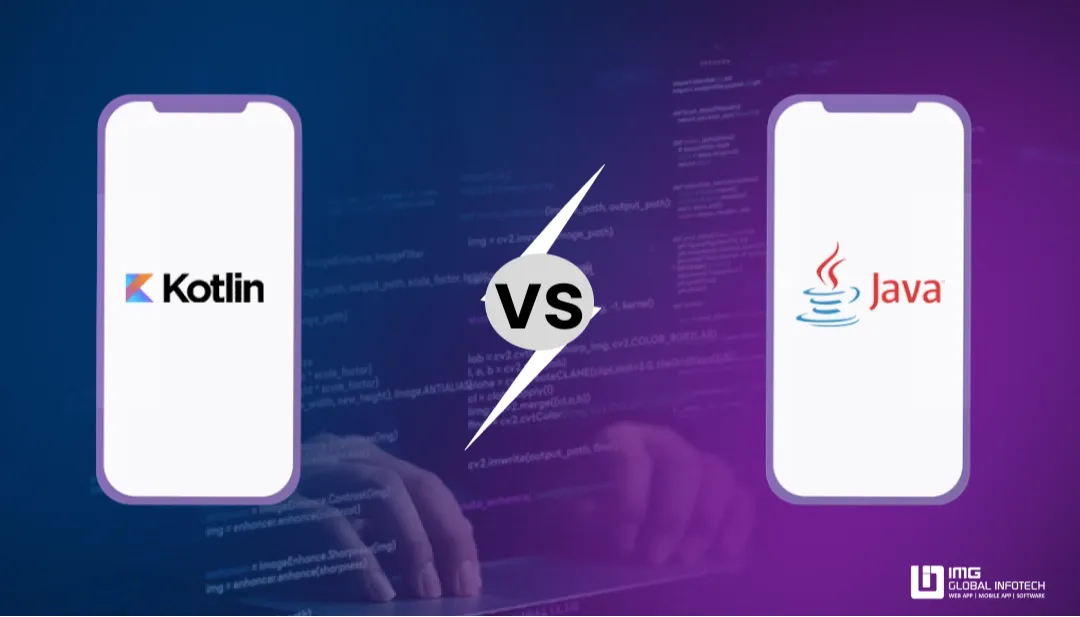
When it comes to mobile app development for android, Kotlin and Java are two of the most prominent programming languages, each offering its own strengths, ecosystem, and community support.
Java is a general-purpose, object-oriented programming language for mobile app development that has been around since the mid-1990s. Developed by Sun Microsystems (now owned by Oracle), Java has long served as the official language for Android development. It's known for its portability, robustness, and widespread use across enterprise systems, web applications, and, of course, mobile platforms.
Kotlin is a modern, statically typed programming language developed by JetBrains, the same company behind IntelliJ IDEA, the IDE used in Android Studio. Kotlin was designed to interoperate fully with Java while offering a more concise and expressive syntax. In 2017, Google officially announced support for Kotlin as a first-class language for Android development.
Kotlin vs Java: The Core Idea
At their core, both Kotlin vs Java for android app development are used to accomplish the same goal, building Android applications. However, Kotlin represents the evolution of Java, addressing many of its shortcomings while preserving compatibility. Java offers stability and legacy support, while Kotlin brings modern syntax, mobile app security best practices, safety features, and increased developer productivity.
Choosing between the kotlin vs java for android development often depends on your project needs, team expertise, and the long-term vision for your mobile application.
kotlin vs java: Key Difference Explained
Choosing between Kotlin and Java for Android development isn’t just about syntax preferences, it can impact app performance, code quality, developer productivity, and future scalability. Here’s a comprehensive, point-by-point breakdown of how Kotlin or Java differ, along with real-world relevance for Android app developers, startups, and enterprises.
1. Syntax and Code Readability
Java vs Kotlin syntax comparison, Kotlin was designed with modern development needs in mind. One of its biggest advantages over Java is cleaner, more concise syntax. While Java tends to be verbose, requiring boilerplate code for even basic operations, Kotlin simplifies common coding tasks significantly.
For example, defining a simple class with getters, setters, and toString() in Java requires several lines. In Kotlin, it can be done in just one line using the data class keyword. This java vs kotlin differences become even more significant in large projects, where shorter code improves clarity and reduces the likelihood of human error.
2. Null Safety
One of the most appreciated features of Kotlin is its null safety system, which helps eliminate the infamous "NullPointerException" , a frequent cause of app crashes in Java.
In Java, any object can be null unless explicitly checked, leading to unexpected runtime failures. Kotlin, by default, does not allow null values unless explicitly defined. It uses nullable (?) and non-nullable types, forcing mobile app developers to address null handling at compile-time. With tools like the safe call operator (?.) and the Elvis operator (?:), Kotlin makes null handling both safer and cleaner.
3. Java vs Kotlin Performance Comparison
When it comes to runtime performance, differences between Kotlin and Java are nearly identical. Both compile to Java bytecode and run on the JVM, so apps developed in either language perform similarly in most real-world scenarios.
However, a few performance-related observations include:
-
Java tends to have faster compilation times, especially in large codebases with frequent builds. This can be advantageous during early-stage development or rapid prototyping.
-
Kotlin may introduce slight overhead when using advanced features like lambdas, inline functions, or coroutines, especially if misused or unoptimized.
Despite that, Kotlin’s smart compiler and growing optimization capabilities have minimized these performance gaps over time.
4. Code Comparison
To illustrate Kotlin’s simplicity, let’s perform java vs kotlin code comparison for a basic function that returns the maximum of two numbers.
Java:
public int max(int a, int b)
{
return (a > b) ? a : b;
}
Kotlin:
fun max(a: Int, b: Int): Int = if (a > b) a else b
Kotlin enables developers to write less code and achieve more, with fewer bugs and easier mobile app maintenance cost.
5. Functional Programming Support
Kotlin has first-class support for functional programming, a modern programming paradigm that encourages writing clean, reusable, and side-effect-free code. Features like higher-order functions, immutability, and lambda expressions are deeply integrated into Kotlin.
Java started introducing functional programming with Java 8, but it still lacks the intuitive syntax and flexibility that Kotlin offers.
6. Interoperability with Java
One of Kotlin’s strongest advantages is that it is 100% interoperable with Java. You can call Kotlin code from Java and vice versa. This allows teams to incrementally introduce Kotlin into an existing Java-based project without rewriting everything from scratch.
You can start by writing new features in Kotlin while keeping the old ones in Java. Kotlin also provides helpful annotations like @JvmStatic, @JvmOverloads, and @JvmField to smooth out interactions with Java code.
7. Learning Curve and Community Support
Java is older and has a massive global community, extensive learning materials, and time-tested documentation. It’s often the first programming language taught in universities, so many android app developers for hire are familiar with it.
Kotlin, although newer, has rapidly grown in popularity. Google’s backing has fueled a large wave of adoption, leading to an increase in tutorials, courses, and community contributions.
-
Beginners may find Java easier to grasp due to its straightforward nature.
-
Experienced developers often prefer Kotlin for its expressiveness and modern toolset.
8. Android Studio and Tooling Support
Since Kotlin became a first-class language for Android, the benefits of Kotlin over Java is, Android Studio (which is based on IntelliJ IDEA, also developed by JetBrains) has continuously improved its support for Kotlin.
Today, Kotlin enjoys:
-
Better IDE suggestions
-
Real-time error detection
-
Auto-conversion tools from Java to Kotlin
-
More stable Gradle support
While Java is still fully supported, Kotlin offers a more future-proof development experience inside Android Studio.
Advantages and Disadvantages of Java and Kotlin for Android App Development
Java vs Kotlin for android app development have their own set of pros and cons. Understanding these can help you select the right language depending on your project scope, team expertise, and long-term goals.
Advantages of Java for Android Development
-
Widespread Adoption & Legacy Codebase
-
Java has been the foundation of Android since the beginning. As a result, millions of apps and libraries are written in Java.
-
Ideal for maintaining and upgrading legacy apps.
-
-
Extensive Learning Resources
-
Due to its age and popularity, Java offers a vast pool of tutorials, documentation, community forums, and developer support.
-
A good fit for beginner developers entering Android development.
-
-
Large Developer Community
-
With a strong global talent pool, organizations looking to hire core java developers can find experienced professionals familiar with Android ecosystems, making collaboration and long-term support easier.
-
Issues are more likely to be documented and resolved.
-
-
Faster Compilation Speed
-
Java often compiles faster than Kotlin, especially for large-scale enterprise applications or older Android projects.
-
-
Platform Independence
-
Java’s “write once, run anywhere” philosophy makes it a versatile language, extending beyond Android to web, enterprise, and desktop apps.
-
Disadvantages of Java for Android Development
-
Verbose Syntax
-
Java code can be lengthy and repetitive, leading to more boilerplate code and higher chances of human error.
-
-
Null Pointer Exceptions (NPEs)
-
Java doesn’t have built-in null safety, making it prone to NullPointerExceptions, one of the most common causes of Android app crashes.
-
-
Slower Innovation
-
Java evolves slowly compared to modern languages. Some newer programming concepts (e.g., functional programming) are either limited or only partially supported.
-
-
No Native Coroutines
-
Handling asynchronous tasks and multithreading is more complex in Java compared to Kotlin’s coroutine support.
-
Advantages of Kotlin for Android Development
-
Concise and Clean Syntax
-
Kotlin significantly reduces the amount of code needed to accomplish tasks. Fewer lines of code = fewer bugs + easier maintenance.
-
-
Built-in Null Safety
-
One of Kotlin’s standout features is its strong null safety system, helping developers avoid app crashes due to null references.
-
-
Modern Programming Features
-
Kotlin supports functional programming, extension functions, higher-order functions, and coroutines, enabling faster and smarter development.
-
-
Seamless Java Interoperability
-
Kotlin is 100% interoperable with Java. You can gradually migrate codebases or integrate Kotlin in existing Java projects without issues.
-
-
First-Class Support by Google
-
Kotlin is the preferred language for Android app development as per Google. Android Studio provides enhanced tooling, and new Jetpack libraries are Kotlin-first.
-
-
Coroutines for Asynchronous Programming
-
Kotlin’s coroutine system simplifies background task execution, making code cleaner and less prone to memory leaks.
-
-
Smart Casts and Type Inference
-
The compiler automatically detects types and reduces the need for redundant code, improving developer speed and accuracy.
-
Disadvantages of Kotlin for Android Development
-
Steeper Learning Curve for Beginners
-
Developers new to Android or programming may find Kotlin’s syntax and advanced features harder to grasp compared to Java.
-
-
Slower Compilation (in Some Cases)
-
Although Kotlin has improved, incremental builds and annotation processing may be slower than Java in large projects.
-
-
Smaller Community (Compared to Java)
-
Kotlin's community is still growing, and while support is strong, it’s not as mature or extensive as Java’s.
-
-
Increased App Size (Sometimes)
-
Kotlin's standard libraries and advanced features may slightly increase APK size, though this is usually negligible for modern devices.
-
Which One to Choose for Android App Development: Java vs Kotlin
Choosing between Kotlin vs Java for android development isn’t about declaring one as universally better than the other, it’s about aligning your choice with your project’s goals, team strengths, technical requirements, and long-term vision.
Let’s break down Java or Kotlin based on practical use cases:
Choose Java If…
-
You’re Maintaining a Legacy Codebase
-
If your app was originally built in Java or heavily relies on Java-based libraries, sticking with Java makes sense for continuity and cost efficiency.
-
-
Your Team is Already Java-Proficient
-
When your in-house developers or hired dedicated developers team have strong Java experience, it might be more productive to build on that rather than training everyone in Kotlin from scratch.
-
-
You Need Proven Stability for Enterprise Apps
-
Java has powered Android apps for over a decade. Its stability, maturity, and large ecosystem make it a safe choice for long-term enterprise projects.
-
-
Faster Compilation Is a Priority
-
In large applications, Java’s build times may be slightly faster than Kotlin, which can be helpful during rapid development and testing phases.
-
Choose Kotlin If…
-
You’re Starting a New Android Project
-
For greenfield apps, Kotlin offers a clean slate with modern programming tools, concise syntax, and stronger safety features, setting a solid foundation for future growth.
-
-
You Want Cleaner, More Maintainable Code
-
Kotlin helps reduce boilerplate and improves code clarity. This translates to fewer bugs, faster debugging, and lower maintenance costs over mobile app development time.
-
-
App Stability is Critical
-
Null safety is built into Kotlin, preventing many common runtime crashes caused by null references, a major issue in Java-based Android apps.
-
-
You Plan to Use Coroutines or Jetpack Compose
-
Kotlin’s coroutines simplify asynchronous tasks, and Jetpack Compose (Android’s modern UI toolkit) is Kotlin-first, meaning your development will be smoother and more future-proof.
-
-
You Want Google’s Backing and Ecosystem Support
-
Google has declared Kotlin as the preferred language for Android app development, which means most new tools, libraries, and documentation will prioritize Kotlin moving forward.
-
Conclusion
Both Java and Kotlin for app development are powerful languages that continue to shape the Android development ecosystem. Java brings decades of reliability, community support, and compatibility, making it a solid choice for maintaining legacy apps or building enterprise-grade solutions. On the other hand, Kotlin is a modern, concise, and safer alternative that enhances developer productivity and aligns closely with Google’s vision for Android’s future.
If you're building a new Android app in 2026, Kotlin is the smarter investment for long-term scalability, performance, and innovation. However, if you're working on existing Java-based codebases, or have a Java-skilled team, continuing with Java still remains a practical and stable approach.
The best choice between Java or Kotlin depends on your project goals, team expertise, and development timeline. And thanks to their seamless interoperability, adopting a hybrid Kotlin-Java approach can offer the flexibility needed to transition without risk.
-
 Top 10 Flower Delivery Apps in 2026
Top 10 Flower Delivery Apps in 2026
-
 Top Generative AI Trends in 2026: A Complete Industry Guide
Top Generative AI Trends in 2026: A Complete Industry Guide
-
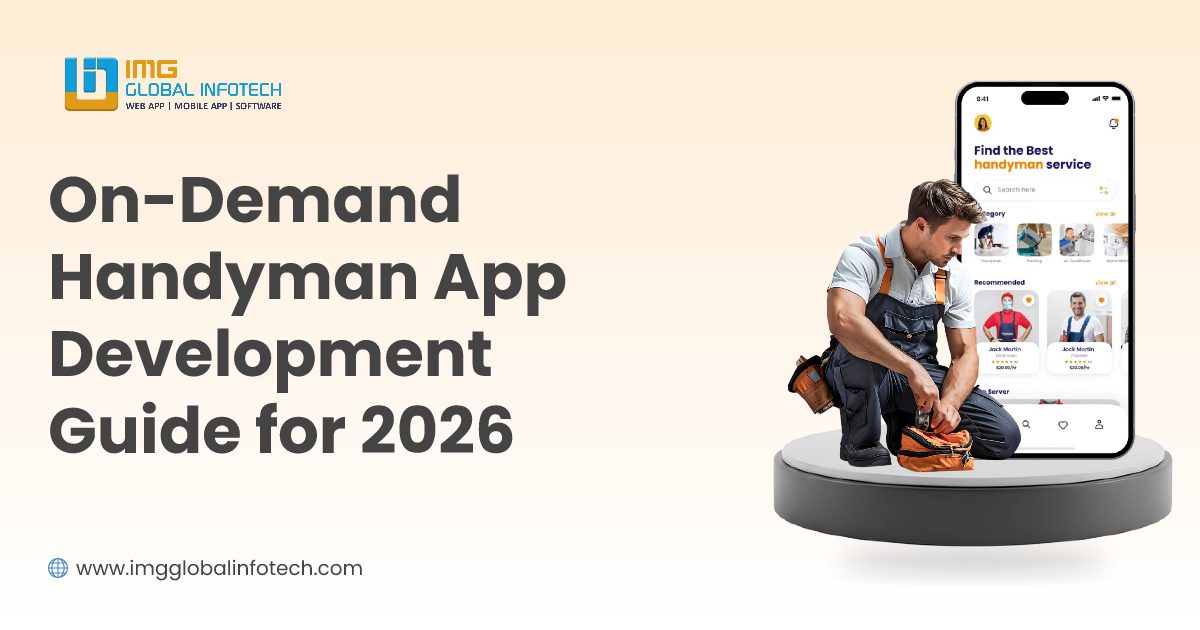 On-Demand Handyman App Development Guide for 2026
On-Demand Handyman App Development Guide for 2026
-
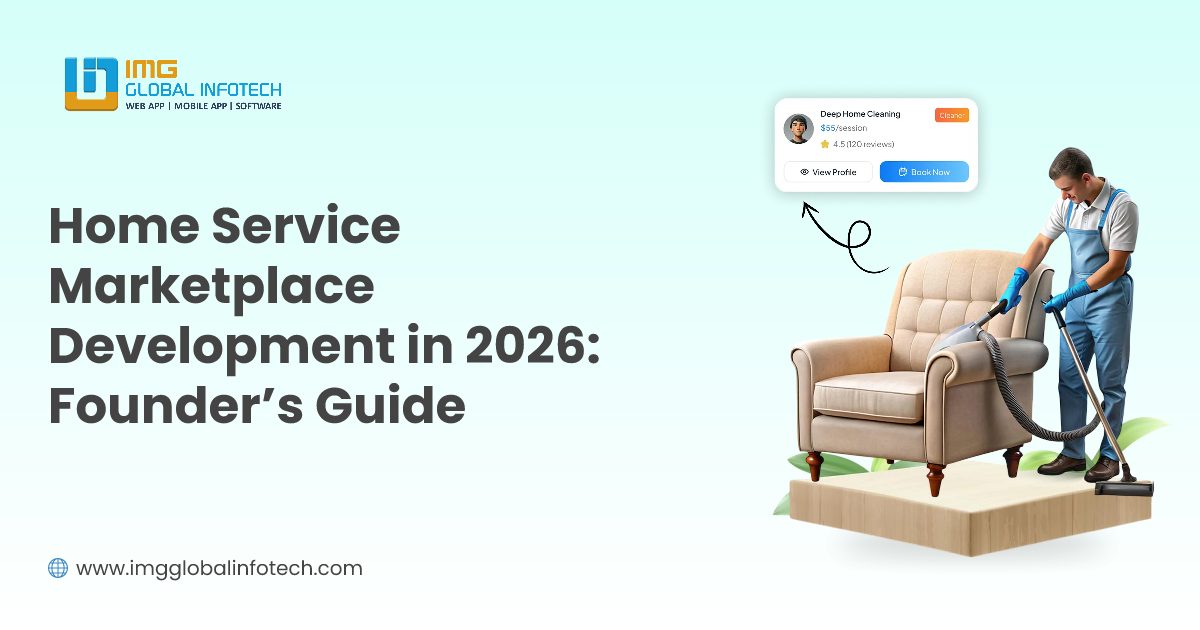 How to Build a Home Service Marketplace in 2026: Founder’s Guide
How to Build a Home Service Marketplace in 2026: Founder’s Guide
-
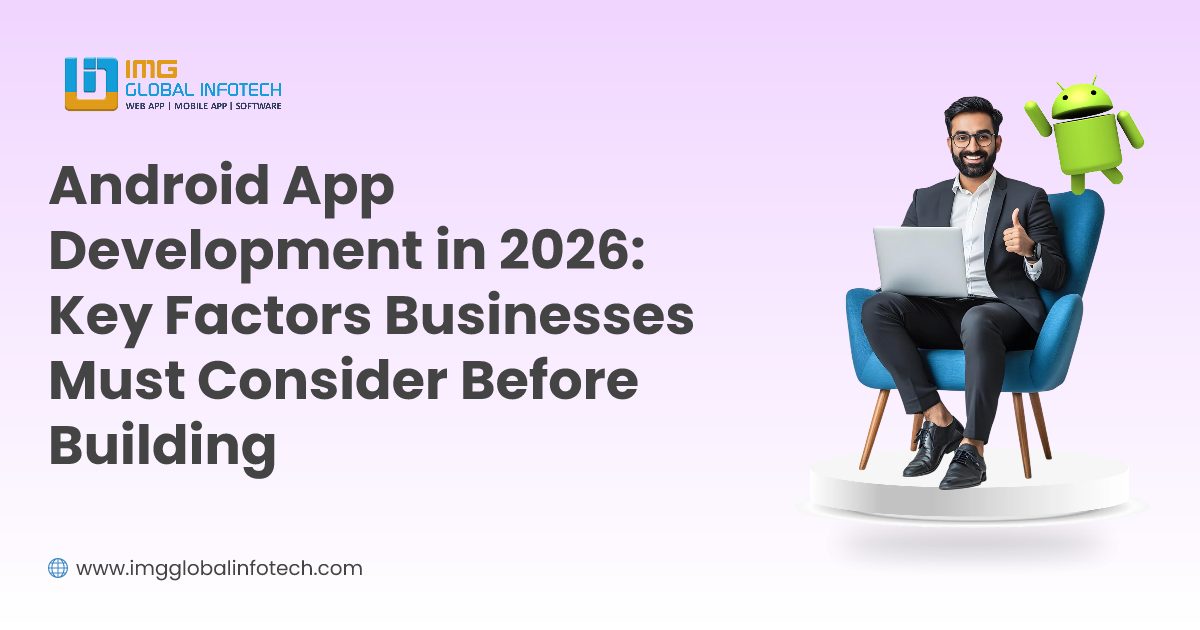 Android App Development in 2026: Key Factors Businesses Must Consider Before Building
Android App Development in 2026: Key Factors Businesses Must Consider Before Building
-
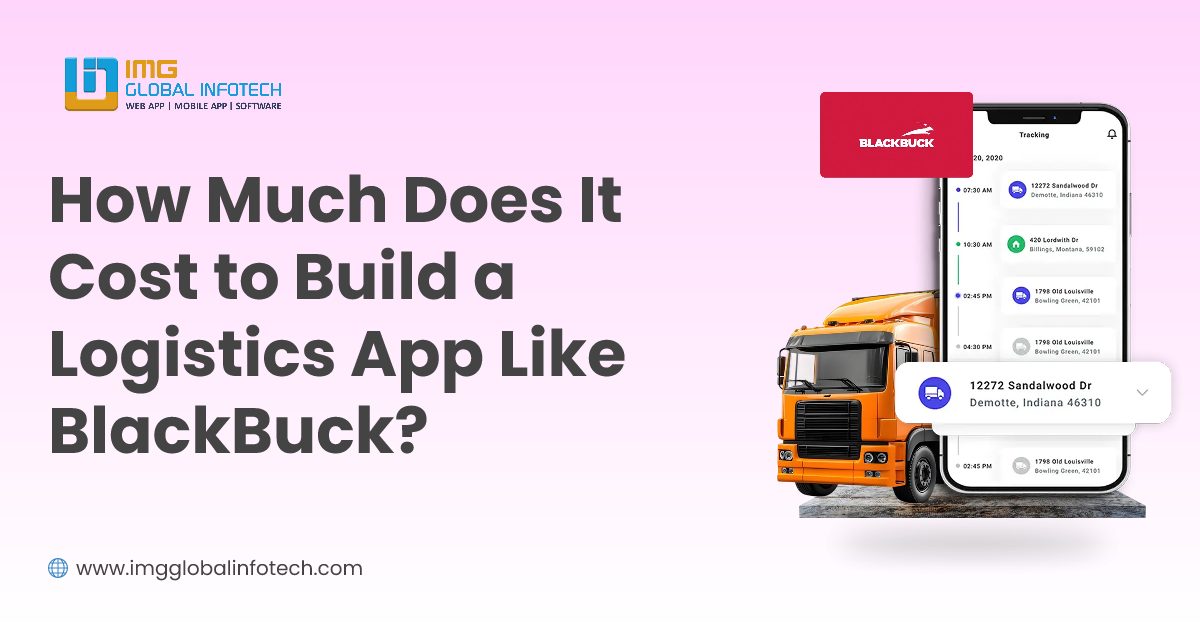 How Much Does It Cost to Build a Logistics App Like BlackBuck?
How Much Does It Cost to Build a Logistics App Like BlackBuck?
Mohit Mittal is the co-founder of a leading IT company with over a decade of experience in driving digital transformation and innovative tech solutions. With a strong background in software development, Mobile app development, E-commerce, business strategy, and team leadership, Mohit Mittal is passionate about helping businesses scale through technology. When not solving complex tech challenges, he enjoys sharing insights on emerging trends, entrepreneurship, and the future of IT.


